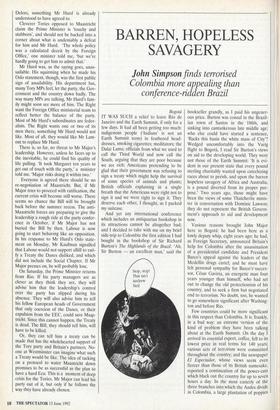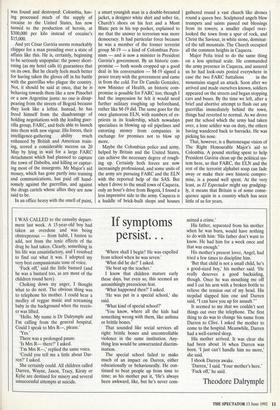BARREN, HOPELESS SAVAGERY
John Simpson finds terrorised
Colombia more appealing than conference-ridden Brazil
Bogota IT WAS SUCH a relief to leave Rio de Janeiro and the Earth Summit, if only for a few days. It had all been getting too much: indigenous people (`Indians' is not an Earth Summit term) in feathered head- dresses, smoking cigarettes; meditators; the Dalai Lama; officials from what we used to call the Third World and now call the South, arguing that they are poor because we are rich; Americans pretending to be glad that their government was refusing to sign a treaty which might help the survival of some species of animals and plants; British officials explaining in a single breath that the Americans were right not to sign it and we were right to sign it. They deserve each other, I thought, as I packed my suitcase.
And yet any international conference which includes an antiquarian bookshop in its attractions cannot be altogether bad; and I decided to take with me on my brief side-trip to Colombia the first edition I had bought in the bookshop of Sir Richard Burton's The Highlands of the Brazil. `Ah, Sir Burton — an excellent man,' said the
bookseller grandly, as I paid his ungener- ous price. Burton was consul in the Brazil- ian town of Santos in the 1860s, and sinking into cantankerous late middle age; who else could have started a sentence, `Backs this basin the white mass of City'? Wedged uncomfortably into the Varig flight to Bogota, I read Sir Burton's views on aid to the developing world. They were not those of the Earth Summit: 'It is evi- dent in our present state that every pound sterling charitably wasted upon catechizing races about to perish, and upon the barren hopeless savagery of Africa and Australia, is a pound diverted from its proper pur- pose.' Two years ago, those might have been the views of some Thatcherite minis- ter in conversation with Dominic Lawson; they do not represent the British Govern- ment's approach to aid and development now.
Various reasons brought John Major here to Bogota: he had been here as a lowly deputy whip, eight years ago; he had, as Foreign Secretary, announced Britain's help for Colombia after the assassination of a presidential candidate and President Barco's appeal against the leaders of the Medellin drugs cartel; and he must have felt personal sympathy for Barco's-succes- sor, Cesar Gaviria, an energetic man four years younger than himself, who had set out to change the old protectionism of his country, and to seek a firm but negotiated end to terrorism. No doubt, too, he wanted to go somewhere significant after Washing- ton and before Rio.
Few countries could be more significant in this respect than Colombia. It is frankly, in a bad way: an extreme version of the kind of problem they have been talking about at the Earth Summit. On the day I arrived its essential export, coffee, fell to its lowest price in real terms for 140 years; various acts of terrorism were committed throughout the country; and the newspaper El Espectador, whose views seem even fiercer than those of its British namesake, reported a continuation of the power-cuts which black out the country for up to seven hours a day. In the most easterly of the three branches into which the Andes divide in Colombia, a large plantation of poppies was found and destroyed: Colombia, hav- ing processed much of the supply of cocaine to the United States, has now turned to the production of heroin, at $300,000 per kilo instead of cocaine's $15,000.
And yet Cesar Gaviria seems remarkably chipper for a man presiding over a state of affairs like this. He is, certainly, beginning to be seriously unpopular: the power short- ening (as my hotel calls it) guarantees that on its own. But he clearly feels much better for having taken the gloves off in his battle with the guerrillas who plague the country. Not, it should be said at once, that he is behaving towards them like a new Pinochet or a new Argentine junta: no one is disap- pearing from the streets of Bogota because they look like a leftist. Instead, he has freed himself from the disadvantage of holding negotiations with the leading guer- rilla group, FARC, and feels able to launch into them with new vigour. His forces, their intelligence-gathering ability much enhanced by British and American train- ing, scored a considerable success on 20 May by lying in wait for a large FARC detachment which had planned to capture the town of Dabeiba, and killing or captur- ing most of the insurgents. Mr Major's aid money, which has gone partly into training and communications, has paid off hand- somely against the guerrillas, and against the drugs cartels whose allies they are now said to be.
In an office heavy with the smell of paint, a smart youngish man in a double-breasted jacket, a designer white shirt and sober tie, Church's shoes on his feet and a Mont Blanc pen in his top pocket, explained to me that the answer to terrorism was more democracy. It had particular force because he was a member of the former terrorist group M-19 ---- a kind of Colombian Pero- nism — and is now a minister in President Gaviria's government. By an historic com- promise — both words cropped up a good deal in his conversation — M-19 signed a peace treaty with the government and came in from the cold. For Dr Camilo Gonzalez, now Minister of Health, an historic com- promise is possible for FARC too; though I had the impression he felt it would need further military roughing up beforehand, rather like M-19 did. The same goes for the once glamorous ELN, with numbers of ex- priests in its leadership, which nowadays specialises in blowing up oil pipelines and extorting money from companies in exchange for promises not to blow up more.
Maybe the Colombian police and army, helped by Britain and the United States, can achieve the necessary degree of rough- ing up. Certainly both forces are now increasingly professional, and some units of the army are pursuing FARC and the ELN with the reported help of the SAS. But when I drove to the small town of Caqueza, only an hour's drive from Bogota, I found a less impressive side to the army. Caqueza is a huddle of brick-built shops and houses gathered round a vast church like drones round a queen bee. Sculptured angels blew trumpets and saints passed out blessings from its towers; a smalle'r chapel over- looked the town from a spur of rock, and Christ the Saviour, in white stone, dominat- ed the tall mountain. The Church occupied all the common heights in Caqueza.
Major Pena tried to do the same thing on a less spiritual scale. He commanded the army presence in Caqueza, and assured us he had look-outs posted everywhere in case the two FARC battalions in the mountains staged an attack. Soon after we arrived and made ourselves known, soldiers appeared on the streets and began stopping cars and buses. By the time we left, after a brief and abortive attempt to flush out any guerrillas immediately behind the town, things had reverted to normal. As we drove past the school which the army had taken over, a lone soldier was on duty, the others having wandered back to barracks. He was picking his nose.
That, however, is a Burtonesque vision of The Right Honourable Major's aid to Colombia. A pound sterling spent to help President Gaviria clean up the political sys- tem here, so that FARC, the ELN and the rest of the terrorist alphabet soup can fade away or make their own historic compro- mise, is a pound well spent. At the very least, as El Espectador might say grudging- ly, it means that Britain is of some conse- quence again in a country which has seen little of us for years.



















































 Previous page
Previous page